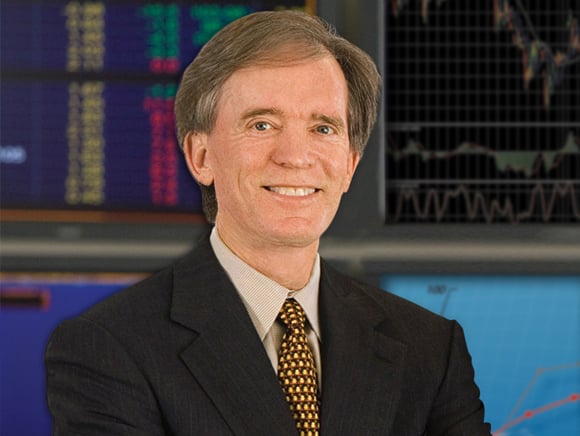Professor of finance pokes fun at Bill Gross — and sees continued run-up in stock prices
The long-term economic outlook is not great and there are plenty of challenges ahead, but the near-term cyclical stock market rally still has room to grow, according to Richard Marston, professor of finance at the University of Pennsylvania's Wharton School.
“We are in an expansion phase and I don't care what the consumer sentiment data says,” Mr. Marston said today in his address at the Investment Management Consultants Association's annual conference in Las Vegas.
“In the near term we've got a lot of room to grow in this cyclical rebound,” he added.
In his presentation Mr. Marston took a few friendly jabs at Pacific Investment Management Co. co-chief investment officer Bill Gross for forecasting a “new normal” in the spring of 2009 when the stock market was near its low point.
“Bill Gross introduced the notion of a new normal in the spring of 2009, and from that point through March of this year the stock market gained 94%,” Mr. Marston said. “It was terrible timing to call for a new normal,” which included reduced allocations to domestic equities and lower investment return expectations.
“If your clients bailed out of the market during that grim winter of 2008 and 2009 they lost out on an almost 100% rally,” he said.
Mr. Marston also poked fun at popular consumer sentiment reports and the media coverage of such data.
“If you believe the consumer is on strike, just look around this casino or get on an airplane flying to Vegas,” he said. “Don't tell me the consumer is on strike; that's nonsense.”
Mr. Marston also pointed out that U.S. exports are now at a higher level than they were before the financial crisis.
The only holdout in the recovery, he added, is business, and that's where the bad news starts to emerge.
“Business investment is not back,” he said. “And the employment situation really depresses me, because it's going to take a while to get real improvement in the employment picture.”
A big part of the employment issue is the high level of productivity that companies are now enjoying.
“Our manufacturing production is twice as high as it was in 1980 because of the highly automated nature of industry,” he said.
Not only is manufacturing becoming a more specialized and technical field that requires more education and training, but the number of manufacturing jobs in this country has shrunk to 11.5 million from 18.7 million in 1980.
“That won't change, and it's a trend that has been going on for 30 years or longer,” he said.
The performance of emerging-market equities, he added, is another signal of the transfer of growth from developed to emerging economies.
Ultimately, it adds up to “returns on equities will be harder to obtain, and we'll have to think in terms of alternatives, and especially good alternative managers.”
In an analysis comparing the Yale University endowment with a traditional allocation to stocks and bonds, Mr. Marston pointed out that Yale allocates just 7.5% to domestic equities and only 10% to foreign equities.
The largest Yale allocation is to real assets at 37%, followed by private equity at 26%, and absolute return at 15%.
The Yale strategy has outperformed the conventional portfolio by 4.3% since 1985, he said, with more than half of that outperformance coming via access to quality managers.
He acknowledged that anyone with less than $50 million is not likely to gain access to the kinds of managers Yale is investing with.
He added, however, that that shouldn't prevent anyone from diversifying beyond stocks and bonds.
Along those lines, he suggested an allocation to real assets, including — but not limited to — property.







